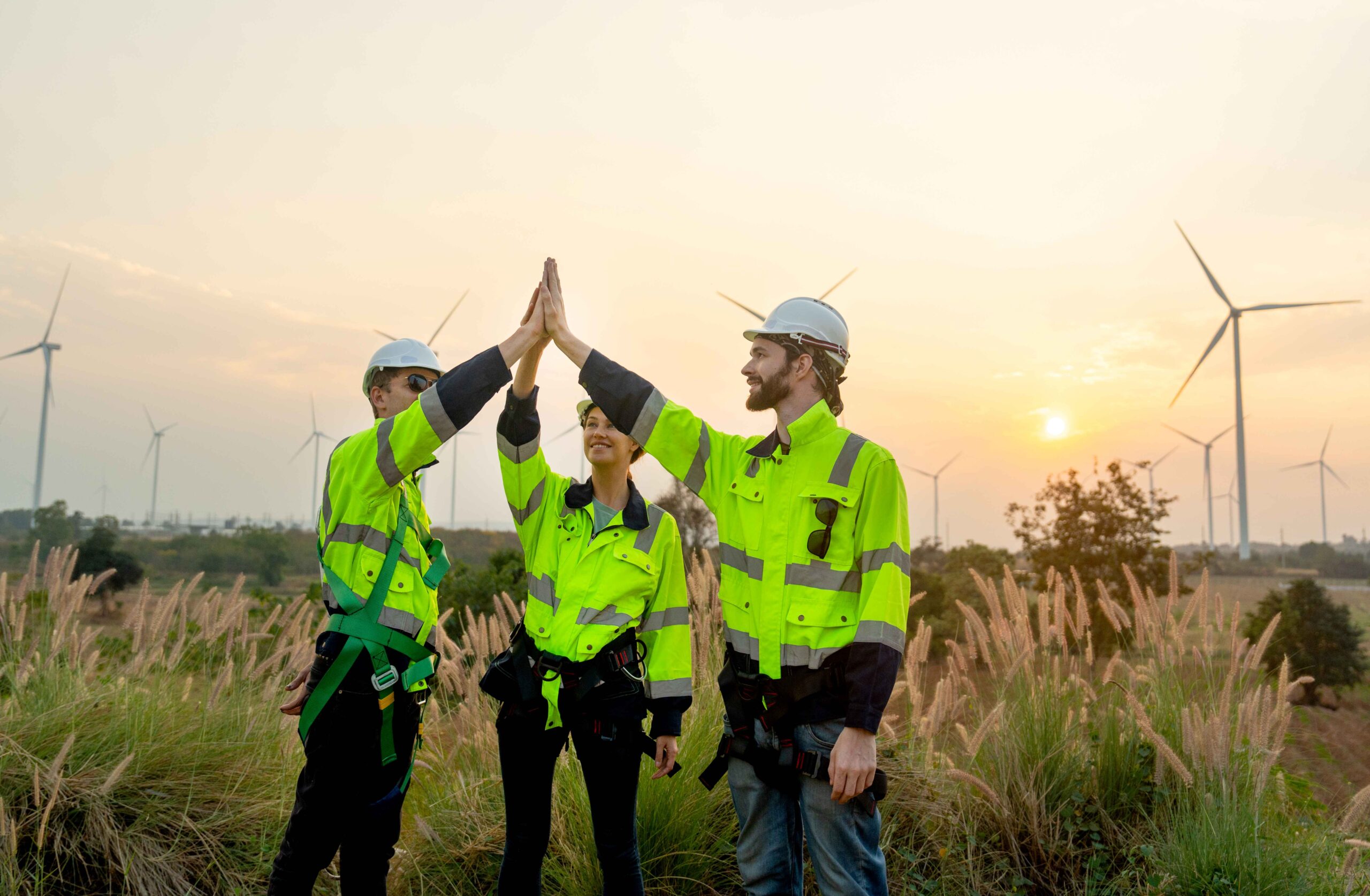
Son casi las diez de la mañana en Sevilla. Hace calor en la plaza frente al ayuntamiento y los transeúntes van a lo suyo, algunos con prisa y otros deteniéndose junto a la fuente. Entre ellos se encuentra Eduardo, un hombre alto con camisa clara y gafas de sol. Hace unos meses, trabajaba como mozo de almacén, sobreviviendo con trabajos temporales, y pensaba que sus posibilidades de encontrar un trabajo estable eran nulas. Ahora tiene un nuevo trabajo. Enseña a los huéspedes de los hoteles de la Costa del Sol a reducir su impacto medioambiental y habla de ello con orgullo.
Lee también:
La iniciativa educativa global de Uri Poliavich y su trabajo a través de Yael Foundation.
A su lado está José Manuel. Hace poco ha terminado un curso de instalación de paneles solares. Hace un par de años, soñaba con un trabajo estable, pero no sabía dónde encontrarlo. Hoy está convencido de que va por el buen camino. Junto con otros participantes en el programa, ha asistido a la ceremonia de graduación.
Estos dos hombres no se conocen, pero comparten un camino común. Formaron parte de un proyecto que surgió en respuesta a una pregunta sencilla, pero inquietante: ¿adónde van aquellos que quieren trabajar, pero se encuentran fuera del mercado? Esta pregunta es especialmente acuciante en Andalucía, donde miles de personas buscan una oportunidad para integrarse en una nueva economía, en la que la tecnología se combina con el cuidado de la naturaleza y la formación ofrece la oportunidad de formar parte del cambio.
La solución llegó de la mano de dos organizaciones. Una es la Fundación Endesa, conocida por sus iniciativas de desarrollo sostenible. La otra es la Fundación Konecta, que trabaja en proyectos sociales y apoya a colectivos vulnerables. Juntas pusieron en marcha Hub Empleo Verde, un centro de empleo verde. El nombre suena sencillo, pero detrás hay todo un sistema: formación, orientación, apoyo y creación de empleo. Todo ello para quienes se encuentran en una situación difícil, pero quieren pasar a la acción.
Cómo cambia la vida la formación en el centro
Solo unas pocas docenas de personas se inscribieron en el primer curso cuando se inauguró el centro. Algunos tenían experiencia en la construcción, otros venían de un largo periodo sin trabajar y otros estaban considerando por primera vez que la «economía verde» podía ser una oportunidad real. Los profesores hablaban con sencillez, mostraban mucho en la práctica y no metían prisa. Las primeras clases se dedicaron al funcionamiento de los paneles solares, los sistemas de recogida de agua de lluvia y el reciclaje de residuos en los hoteles.
Todos los participantes recibieron conocimientos y apoyo. Para algunos, lo más importante era recuperar la confianza en sí mismos. Para otros, era sentir que ya no estaban solos, que había un equipo y unos mentores. La actitud hacia las personas aquí se basa en el respeto. Se les trata como socios.
Cuatro direcciones para una carrera sostenible
Al cabo de un par de meses, quedó claro que el formato funcionaba. Además de un diploma, la formación ofrecía oportunidades concretas de empleo. Por eso se desarrollaron cuatro áreas:
- Cursos sobre la instalación y el mantenimiento de paneles solares;
- Formación en ecoturismo y educación ambiental;
- Formación para especialistas en gestión de residuos.
- Programas para aspirantes a emprendedores en el ámbito de las soluciones sostenibles.
Cada área incluye un componente práctico. Después de clase, los participantes visitan instalaciones, hablan con empleadores y ven cómo se aplica la teoría. El sistema está diseñado para que, al finalizar el curso, todos tengan la oportunidad de conseguir un contrato.
Pero el elemento más importante sigue siendo el apoyo. Tras la graduación, el Centro sigue supervisando los progresos de sus graduados. Los mentores les ayudan a redactar currículos, a prepararse para las entrevistas y a ponerse en contacto con los empleadores. En los casos más complicados, se recurre a los servicios sociales y a las organizaciones sin ánimo de lucro con las que el Centro ha establecido acuerdos de colaboración.
En la segunda mitad del programa, se selecciona a los participantes para itinerarios individuales. A cada participante se le asigna un itinerario en función de sus capacidades, objetivos y circunstancias.
El gran éxito del proyecto
Cuando el proyecto estaba empezando, muchos empresarios se mostraron recelosos. La agenda ecológica parecía abstracta y alejada de los retos del mundo real, y la inclusión de grupos vulnerables parecía demasiado atrevida. Todo cambió tras los primeros resultados. Los empleadores que invitaron a los participantes a realizar prácticas destacaron su disciplina, su compromiso y su voluntad de aprender. Algunos de ellos incluso se ofrecieron a ampliar la colaboración.
El equipo del proyecto estableció un diálogo con las asociaciones industriales para garantizar la sostenibilidad de la colaboración con las empresas. Se organizaron reuniones periódicas, sesiones de formación y desayunos de trabajo. Los empleadores compartieron sus expectativas y los coordinadores mostraron cómo se impartía la formación. Poco a poco, comenzó a formarse una red de empresas dispuestas a invertir en la causa común.
En la actualidad, más de 100 organizaciones participan en el proyecto. Entre ellas se encuentran:
- Hoteles y moteles que aplican normas medioambientales
- Empresas de transformación que necesitan personal cualificado
- Empresas de instalación de paneles solares
- Pequeñas cooperativas que buscan formas de crecer en el nuevo entorno.
A cada uno se le asignó una persona que entiende por qué está allí y qué valor puede aportar.
El centro colabora estrechamente con las pequeñas empresas. Sus representantes les ayudan a incorporar enfoques medioambientales en sus prácticas diarias. Esto crea vínculos que benefician a todos los implicados: los empresarios reciben apoyo, los participantes en el proyecto obtienen oportunidades de trabajo y desarrollo, y la economía regional gana nuevos puntos de crecimiento.
Conclusión
En Andalucía se ha inaugurado un centro que está cambiando la percepción del empleo. Demuestra que la sostenibilidad es una oportunidad para todos. En solo unos meses, se han reunido aquí grupos vulnerables, representantes empresariales, autoridades regionales y organizaciones comunitarias. Juntos, crean puestos de trabajo y construyen una economía en la que todas las voces cuentan. El centro se ha convertido en un ejemplo de cómo el cuidado del medio ambiente puede ir de la mano del cuidado de las personas. Este ejemplo ya está cambiando las reglas del juego.
